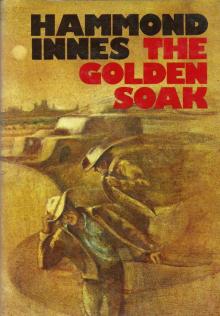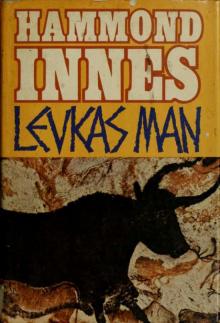- Home
- Hammond Innes
Maddon's Rock Page 8
Maddon's Rock Read online
Page 8
I sat with her for quite a while. I don’t know what we talked about. I only know that I enjoyed talking with her. She was natural, friendly—easy to talk to. We had the love of the sea in common.
Shortly after midday the corvette rejoined the convoy. The gale had blown itself out and the sea was falling. When I went on deck after lunch a watery gleam of sunshine picked out the white flecks of the wind-broken sea. We were passing along the southern fringe of the convoy. The merchant ships wallowed slowly in the remnants of the gale like a flotilla of ungainly ducks. Ahead of us the slim grey lines of the destroyer Scorpion patrolled in a smother of spray. I returned to the sickbay. Shortly afterwards came the faint sound of the loud-hailer. The skipper of the Bravado was reporting to the Commander of the Scorpion. I wondered how he felt, poor devil, losing the one ship in the convoy that carried a valuable cargo for the British Treasury.
Bert got steadily worse during the day. He didn’t cough much, but fever burned in his eyes and by the evening his temperature was up to 104. He still tried to crack an occasional joke, but his voice was weak and he lay in a semi-coma. The medical orderly suspected pneumonia.
I had tried to comfort him with the thought that in about thirty-six hours we would be in Leith and a doctor would come on board. But when I went up on deck the next morning for a blow before breakfast, there was no sign of the convoy and the corvette was hurrying north. I asked one of the crew why this was—were we making for Scapa? He said, “No, Iceland. The Old Man’s had orders to pick up a couple of Yankee freighters at Reykjavik and escort them down to meet a westbound Atlantic convoy.”
Back in the sick-bay Bert’s fever-bright eyes looked up at me over the bedclothes. “Are we nearly there, Corp?” he whispered.
“No, Bert,” I replied. “We’ve left the convoy. We’re bound for Iceland.”
He gave a little grunt and closed his eyes. I thought he had gone off to sleep again. But in a moment he said, “Just the job, Iceland—get me silly temperature da’n.” And his face cracked into a tired grin.
Jennifer came to visit him in the afternoon. Her red jumper, freshly washed, was a gay splash of colour in the little sick-bay. Her face looked bright and cheerful. The dark rings under her eyes had gone and her skin had more colour in it. There was even a gleam of laughter in her grey eyes. It wasn’t until she had been in the room several minutes that it dawned on me why she looked so gay. “You’ve got hold of some lipstick,” I said. “Wherever did you find that on a warship?”
She laughed. “The skipper. He’s a dear. When he lent me that sweater of his he rather shyly produced some powder and lipstick. Last port he was in was Calais and he’d bought cosmetics for his girl friends and his sister. He said he was sure his sister wouldn’t mind.”
For some reason I felt sullen and angry. When the medical orderly came in, she took him on one side and questioned him. It seems she knew all about pneumonia. I suppose there was plenty of it in the concentration camps. Anyway, she was constantly in and out of the sick-bay after that in the capacity of self-appointed nurse. She confirmed that Bert had pneumonia, but she said he’d be all right. He hadn’t got it badly. The next night he was over the worst. By the time we reached Reykjavik he was sitting up in bed, cracking jokes and demanding his arrears of rum ration. “Pity the Army don’t cotton on ter this ’ere rum ’abit, ain’t it, mate?” was his comment.
Altogether we were nearly three weeks on board the Bravado. I’ll always remember that as one of the happiest times I spent in the Army. The weather turned fine. We were given very little to do. And as nobody fell sick, the skipper left us quartered in the sick-bay, which was a good deal more comfortable than the after-deck. And every day I saw Jennifer. Mostly we talked of sailing. I’d done a month’s sailing among some of the islands off the west coast of Scotland. I knew Oban and Mull and the Kyle of Lochalsh. She told me the story of the Lady’s Rock and about the race that runs between the rock and the lighthouse on Eilean Musdile, of the seals on the islands off Lismore, of lobster breeding, of the story of Duart Castle. She told me of the trips she had done with her brother on her 25-ton ketch, the Eilean Mor, and I in my turn told her of voyages made from my home town of Falmouth. I was with a firm of architects and the junior partner, a fairly wealthy young man, had owned a gaff-rigged cutter. With another fellow and myself as crew we’d done trips to France and even Spain. We’d taken her into most of the ports of Britain’s west coast at one time or another.
So the time passed in a timeless haze of chatting, reading and lazing. We were a week at Reykjavik and left in glorious sunshine with two American Liberty boats. We tacked them on to their convoy some twelve hundred miles from New York and then turned homeward. The rumour got around the ship that we would dock at Falmouth. I stopped the skipper one day and asked him whether it was true. “You see, it’s my home town,” I said, “and it’s nearly a year now since I saw my family.”
He smiled and nodded. “Quite true,” he said. “We’ll dock at Falmouth on the 30th, all being well.”
At ten o’clock on the 30th we steamed past Zose Point and slid into the anchorage beyond the Ferry. A line of Naval patrol boats—ML’s and MTB’s—were moored close to the foreshore and there was a destroyer and two corvettes at anchor. All about me were old familiar things that I had not seen for a long time. The little pier where I’d fallen into the water as a kid was still there just as it had always been in my lifetime. It was as though I’d never been away. Bert and I stood against the rail looking out on to the town. I was so busy pointing out places to him that I didn’t hear Jenny come up—I’d been calling her that for several days now. “Well, Jim,” she said, “I’m afraid it’s goodbye now.”
She was wearing the khaki greatcoat and little black beret that I had seen her in that first time when she struggled up the gangway of the Trikkala. I hadn’t given this moment a thought and I felt a sudden emptiness.
“Are you going ashore now?” I asked.
“Yes,” she said. “They’re just lowering a boat for me.
I stared at her. She was going ashore. She was walking right out of my life when I’d come to take her presence almost for granted. I suddenly felt I was losing hold of something precious to me. “I’ll—I’ll see you ashore, won’t I?”
But she shook her head. “I’m leaving right away for Scotland,” she said. “I haven’t seen Daddy for over three years. I expect he thinks I’m dead—you see, we couldn’t write. I’m not going to ’phone him. I’m just going to walk right in on him and give him the surprise of his life.”
A rating came up. “Boat’s alongside, Miss Sorrel.”
“Goodbye then, Jim.”
She held out her hand. I took it. I thought her face looked sad. I hoped the parting meant as much to her as it did to me. Then she removed her hand and shook Bert’s. “Goodbye, Bert. Don’t do too much. You’ll feel a bit depressed if you do.”
“Goodbye, Miss Sorrel,” he said. “You must come for annuvver trip wiv us sometime. The Corp an’ I is thinking of startin’ a little company to run trips ter Davy Jones an’ back fer people like you wot ’asn’t ’ad enought hexcitement in their lives.”
She laughed. And then with a little wave she was gone. She never looked back. I leaned over the side watching the boat pull away for the shore. She sat staring straight in front of her. She never once turned her head. It was as though she had turned her back on all that section of her life. She was going home.
The coxswain touched me on the arm. “Captain’s orders, Corporal, and you an’ Cook is to report to the sick-bay and remain there until you’re sent for.”
That brought me back to earth with a jolt. The trip was over. Jenny had gone. We were back in the Army again.
We went below. For two hours we remained in that little sick-bay. Nobody came. Twice I got up with the intention of trying to see the skipper. It was infuriating to be sitting there with my home just across the anchorage, held up by some wretched little bit of red tape. But each
time I sat down again. The skipper was bound to be busy. He’d been very decent to us. He knew my home was in Falmouth. He’d send us ashore as soon as he could.
We were called for food. And finally at two-thirty a rating poked his head round the door. “Wanted on deck, Corporal,” he said. “You an” yer mate.”
“Shall we bring our kit?” I asked.
He said we’d better. He stood in the doorway watching us curiously as we gathered our things together.
My eyes blinked in the sunlight as we came out on deck. A launch was lying alongside. And standing by the rail, close under the bridge, was a military police sergeant.
“’Ullo, ’ullo—wot’s this?” Bert said. “Beastly Red Cap—an’ a sergeant too. Looks like trouble, mate.”
“You Corporal Vardy?” the sergeant asked as we came up. He looked down at a piece of paper he had in his hand. “Corporal J. L. Vardy?”
“Yes,” I said.
“Gunner H. B. Cook?” he asked Bert.
“That’s me, Sarge.”
The sergeant folded the piece of paper up and put it in his pocket. “I have orders to place you both under close arrest,” he said.
For a moment I think I just gaped at him. I couldn’t believe I’d heard correctly. “Place us under arrest?” I said.
“Blimey!” muttered Bert. “Fine ’ome-coming this is.” Then he looked up belligerently. “’Ere, wot are we supposed to ’ave done?” he asked.
“Yes,” I said. “What’s the charge, Sergeant?”
“Mutiny,” he replied. “Come on now. Get into the boat and look sharp about it.”
I never saw my family. And Bert never got up to London to see his missis. We were driven straight from the docks at Falmouth to a military camp near Plymouth, occupied by Number 345 Holding Company. There we were locked in a small room, at the rear of the guard post, which we shared with a frightened little medical fellow waiting to go before a civilian court for assault. This room acted as a temporary cell, the permanent cells being all occupied, and here we spent wretched weeks of waiting.
CHAPTER IV
THE COURT-MARTIAL
THE MORNING AFTER our arrival at the camp we were taken before the Adjutant and remanded. The charge was confirmed as one of mutiny. I asked who had made the charge. The answer was, “A Warrant Officer of the Royal Navy—Rankin.” The Adjutant then informed us that a summary of evidence would be taken and the Camp Commandant would then decide whether he would send us for Court-Martial.
That the charge had been made by Rankin was the first indication we had that we were not the only survivors of the Trikkala. And if Rankin had survived, then Halsey and the others in the Captain’s boat had probably survived as well. I remember as I stood at attention in that drab wooden office, with the spring sunshine cutting a broad shaft through the curling tobacco smoke, I was troubled again by all the doubts and uneasiness that had been in my mind during those last few hours on board the Trikkala. The loose planks, the scraps of overheard conversation, the cook’s story of the Penang, Jukes’ clenched fist when I mentioned the ship’s name, Captain Halsey’s sharp, black eyes, his whispered—it suits us, the ship’s alteration of course, Jukes at the wheel when the explosion took place—it all flooded back into my mind as I stood there staring stiffly at the three polished brass pips on the Adjutant’s service dress. And I cursed myself for not having mentioned any of these things in my report to the skipper of the Bravado. The whole structure of my suspicions had collapsed like a pack of cards as soon as I had heard that we were the only survivors. There had been no point in voicing suspicions that I no longer believed to have any foundation. Now they were all revived.
Back in our quarters I talked it over with Bert. “You’d think the silly fool would ’ave bin willin’ ter let bygones be bygones, wouldn’t yer?” Bert said. “Just you wait till I get me ’ands on that rotten warrant awficer?”
I went over the whole thing with Bert time and time again—the conversations, the feel of those planks shifting under our fingers, the events of that night which had ended with the three of us on the raft. We listed everything we’d heard about Halsey and Hendrik and Jukes and Evans. But we got no further. Vague suspicions, that was all. Nobody to corroborate our evidence, except Jenny. And she knew very little but what I had told her. We needed some supporting evidence of a member of the crew. Perhaps there had been other survivors? If Cousin’s boat had gone, Number One boat might still have been picked up. Even so, we were in a spot. There was no question of our guilt. We had refused to obey the orders of our superior officer, and I, at any rate, had threatened him and a ship’s officer with my rifle. What we had to prove was justification and my heart sank at the thought of trying to put across my frail suspicions as justification to a bench of hard-bitten Regulars sitting in judgment at a Court-Martial.
I suppose I had been pacing the room a long time when Bert said, “Fer Gawd’s sake, why don’t yer sit da’n, mate? Ain’t no use worryin’.” And then on a sudden note of anger: “These guardrooms—they give me the willies. If we was civvies na’, they’d allow us out on bail—then we could at least dra’n our sorrows in a drop of the ol’ pig’s ear.”
I sat down then. I felt depressed and utterly wretched. “I can’t forgive myself for getting you into this mess, Bert,” I said.
He suddenly grinned. “Come on, nark it,” he said. “If you ’adn’t done wot yer did, I’d’ve got into that boat. An’ where should I ’ave bin na’—feedin’ the little fishes, that’s where, like poor little Sills. D’yer reck’n the planks was loose in both the boats, Jim?”
I shrugged my shoulders. Speculation seemed so hopeless now. “I don’t know,” I replied. “I don’t know what to think. One thing I’m certain of now—that is that the planks were loose in the one we examined. Remember? It was Sills who discovered it. Then he did what he was told and got into the boat—poor devil!” I remembered his pinched, frightened little face as he sat there in the bows. I remembered the cat clawing free of the cook and jumping on to the deck. Had the cat known what was going to happen?” If only that second officer, Cousins, had stood by the raft after we had cut it into the water.” I was thinking aloud—going over in my mind all the circumstances as I had been doing all that morning. “Some of them might have been saved then. I suppose they couldn’t see it. It was dark as pitch.” I looked across at Bert. “What I don’t understand,” I said, “is why the Captain didn’t want that raft cleared. I suppose I shouldn’t have insisted. It was his responsibility. I just acted on the spur of the moment. But I don’t understand that. Rankin had reported to the bridge. He must have told Halsey the reason we wouldn’t get into the boat. Yet he ordered Hendrik to stop us cutting the raft clear.”
“Mebbe he wanted the boats to sink,” Bert said. He said it casually—not jokingly, but without thinking. His words echoed my thoughts. For an instant I think I actually believed that that was the truth of it. Then my thoughts came down to earth. It wasn’t possible. It just wasn’t possible. What had he to gain anyway? The Trikkala was sunk.
At that moment the sergeant of the guard came in. “Here you are,” he said. “Letter for each of you. Registered one for you, Corporal.” He held out a book for me to sign.
“Blimey!” said Bert. “A letter from me ol’ trouble. Thanks, Sarge.”
I put the registered envelope down on the scrubbed deal table top. The neat linen paper with the blue lines of its registration was as impersonal as a legal document. I did not need to open it. I knew what would be inside. The address was in Betty’s neat, precise writing. I sat there, staring at it in dumb misery.
Bert had opened his letter. “Gosh!” he said. “Listen to the Ol’ Woman! This is wot she says: “Just like you, Bert, ter get yerself in trouble when yer doo for a munf’s leave an’ I was reckoning on you ter do the washing up an’ look after the kids. However, as you says, better alive an’ in trouble than at the bottom of the sea like that other poor fellow. Though I don’t know wot the ne
ighbours will fink.’” He looked up angrily. “Who on earth cares wot the neighbours fink?” he cried. “That’s the trouble wiv the Ol’ Woman—always worry in’ wot the stupid neighbours fink.”
I had opened the envelope now. The little platinum circle with the rubies and diamonds had rolled out on to the table. It lay there, glittering brightly, accusingly. I read the letter and then tore it up. I couldn’t blame her.
“Wot’s that you got there!” Bert asked suddenly. “Blimey! A ring! Does that mean yer girl’s bin an’ thrown you over on account o’ this?”
I nodded. “It was her father; made her do it,” I said. I wasn’t angry. Just wretchedly depressed. “Remember, I told you it was her idea that I went for a commission? Well—instead of going for a commission, I’m under arrest. Her family is Regular Army. To her, it’s as bad as if I’d been jailed as a common thief.”
“But strewf!” Bert exclaimed. “She don’t know whether you’re guilty or not yet. She don’t know the circumstances.”
“Oh, yes she does,” I replied. “Look at it from her point of view. Her family’s friends are all retired Service people. It was bad enough when she had to admit to being engaged to a corporal. This places her in an impossible position.” He didn’t say a word and I just sat, staring down at the ring, wondering what to do with it. “Wish I had a girl that wrote to me like your missis does, Bert.” I hesitated. A sense of desperate loneliness was closing in on me. “Would you—read me some more of your letter, Bert?” I asked. “It sounded so—so friendly.”
He didn’t answer for a moment—just sat there, his brown eyes watching me sympathetically. I was suddenly very glad Bert was with me. “Okay,” he said. He gave a little forced grin. “But the ol’ girl ain’t very ’ot at expressing ’erself,” he said. “She ain’t got the grammaktical flair wot I ’as.” He turned to the letter again. “Where was I? Oh, yes … Wot the neighbours will fink. ’If you let me know when the trial is an’ where, I’d like ter come along so as I can give their Lordships a piece of me mind if they don’t acquit you, Bert. I could park the brats wiv Mrs. Jackson—that’s the ol’ lady wot’s moved into the rooms up above us. But would they let me in the court? I ’ad a word wiv young Alf wot assists in the grocer’s shop da’n below—’e’s the one I told yer copped a packet at Salerno an’ got ’is ticket ’cos ’e was minus an arm—an’ ’e said ’e didn’t fink civilians was allowed in military courts. Not that ’e’s ever bin court-martialled—’e made that point very plain. Whereupon ’e said …’”

 High Stand
High Stand The Doomed Oasis
The Doomed Oasis Golden Soak
Golden Soak Levkas Man (Mystery)
Levkas Man (Mystery) The Strange Land
The Strange Land Dead and Alive
Dead and Alive Attack Alarm
Attack Alarm The Strode Venturer
The Strode Venturer Campbell's Kingdom
Campbell's Kingdom North Star
North Star The Wreck of the Mary Deare
The Wreck of the Mary Deare The Lonely Skier
The Lonely Skier The Black Tide
The Black Tide The Trojan Horse
The Trojan Horse Medusa
Medusa Air Bridge
Air Bridge Maddon's Rock
Maddon's Rock The Angry Mountain
The Angry Mountain Wreckers Must Breathe
Wreckers Must Breathe Solomons Seal
Solomons Seal The White South
The White South